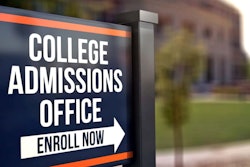University of Georgia President Says School Will Increase Black Enrollment
Only 200 Black students enrolled out of a class of 4,500 freshmen
ATHENS, Ga.
University of Georgia President Michael Adams said the school will take steps in the coming year to increase its enrollment of Black freshmen.
He declined to comment on a faculty committee’s recommendation that the school go back to using race and ethnicity as a factor in freshman admissions. But Adams said the university has not reached its goal of having a diverse student body.
“I do think we’ve got to continue to be more aggressive about minority recruitment,” Adams said earlier this month. “I am very concerned, almost distressed, by the freshman numbers this year and particularly the plight of African American males in this state.”
Only 200 of the 4,500 freshmen enrolled at UGA this fall are Black. Black students make up 5.3 percent of the total student population.
A faculty committee has recommended adding diversity criteria, including race and ethnicity, to the school’s admissions policy as soon as next year. Other efforts to achieve diversity on UGA’s campus have failed, the committee said.
The recommendation is being reviewed by lawyers.
Adams cautioned the recommendation is not final. University officials will decide by late January whether to implement the diversity criteria in time to review applications for the fall 2005 freshman class, he said.
The university dropped its last race-conscious policy in 2001 after a federal judge ruled it unconstitutional. But the U.S. Supreme Court ruled in June that schools can use race as a factor in admissions as long as it is not the only factor.
But critics warn that the university will be sued if it tries to use race in its admissions decisions. The Atlanta-based Southeastern Legal Foundation issued a statement warning the faculty committee’s recommendation “creates a grave constitutional risk for a school administration that has been told not to do it by a federal appeals court.”
The faculty committee also suggested ways the university can increase Black enrollment. They include creating an office of diversity recruitment that would draft a recruitment plan for minorities; hiring an image consultant to address the school’s negative reputation among Blacks; and identifying money for need-based scholarships.
In a recent survey, Black high school students in Georgia said the lack of financial aid at UGA, compared with other schools, was a factor when choosing colleges.
“Clearly we are still suffering some from the days when we were not as welcoming as we are now,” Adams said. “We’ve probably been remiss in not doing a better job on need-based aid. A land grant (university) by definition is a people’s institution.”
— Associated Press
© Copyright 2005 by DiverseEducation.com





















